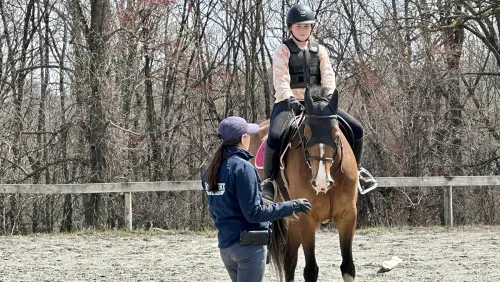Stakeholders in global horse sport met in Lausanne, Switzerland on April 27-28 to debate the most significant format shake-up to championships ever—and ended up with a big divide over radical proposals to reduce international championship teams to three with no drop score.
For the first time, the two-day Fédération Equestre Internationale annual sports forum adopted the single theme: the remodelling of all its disciplines, in the light of changing public perceptions, TV and sponsor demands and the social media-driven future.
Equestrianism within the Olympic movement is again up in the air, following the resolutions the Olympic Agenda 2020 rubber-stamped in December. Simultaneously the FEI has taken extensive professional advice about reinventing the World Equestrian Games, pivotal to which will be shorter, snappier competitions.
FEI president Ingmar de Vos told delegates the sport had to “wake up.” The FEI has been criticised for reactivity. Now, it’s moving to be pro-active, finding solutions before difficult questions about the validity of traditional formats are even asked.
Kit McConnell, sports director of the International Olympic Committee, told the forum that most Olympic sports were expected to embrace change and to encourage universality and the engagement of youth.
The hottest topic put forward by the various sports technical committees was a reduction of Olympic team sizes to three, with no drop score, also to be adopted at WEG and the main regional championships. Fewer riders per team means room at Olympics for more flags, or nations competing.
ADVERTISEMENT
However, while dressage was mostly accepting, jumping and eventing interests robustly resisted this proposal because they felt unjustifiable pressure would be piled on riders to continue when their horse was struggling. It was agreed that further study was necessary into the role of reserve horses and the stage at which they could be substituted.
Aside from horse welfare concerns, U.S. show jumping chef d’equipe Robert Ridland queried as to whether the jumping proposals would actually meet their objective of involving more nations and younger riders. “If your first rider is eliminated, the other two have their Olympic hopes dashed, and that’s against the Olympic spirit,” he said.
“If at the highest level the focus is on only three riders, we could have a trickle-down effect as owners start to realize there is a 25 percent less chance to participate. Our top three were all veterans at the [2014 Alltech FEI World Equestrian Games] and London [Olympic Games]. I can see the youngest riders not being part of the process. Chefs would become more cautious when picking teams and the average age will mostly increase,” Ridland continued.
The FEI dressage committee acceded to a stakeholder request to retain the full-length Grand Prix. In the past week, the International Dressage Trainers Club and a working group of the European Equestrian Federation separately weighed in on controversial plans to shorten it. Most were open to more extensive use of new technology and graphics to make dressage more understandable, and even the possibility of “costume” dress in the freestyle. However, three-time Olympic gold medalist Anky van Grunsven stressed that changes had to be accompanied by publication of a long-awaited handbook on judging criteria.
Jumping and eventing riders were also unhappy about the proposed total separation of team and individual competitions at international championships, with eventers only able to contest one of the two Olympic medal competitions. Suggestions that qualifications will be at the three-star level for eventing teams and four-star for individuals also caused concern, with critics claiming it would lead to a two-tier Olympic offer that did not promote the notion of excellence.
The IOC will consider sports on an “event” basis in future, rather than assessing equestrianism as a single entity. Bruce Haskell, president of the International Event Riders Association, thought the re-vamp should be the catalyst for eventing to shake off the influence of specialist dressage and jumping over its rules and to re-emphasise cross-country.
ADVERTISEMENT
Sonke Lauterbach, secretary-general of the German federation, said: “We do have a well functioning format in eventing. Is this change for the sake of change? Maybe I was asleep but I did not hear [from Kit McConnell] this morning that we are forced to separate the team and individual completely.”
A survey conducted by The Sports Consultancy revealed an overwhelming industry desire to retain the WEG but with greatly reduced costs to make it attractive to bidders, a return to compact venues and fewer participants. It emerged that the regional government of Normandy paid for the € 35 million budget shortfall of WEG 2014. Representatives of the European Broadcast Union told the forum that a 16-day WEG was not palatable or affordable and that nine to 10 days was the optimum.
Charles Barnett, a distinguished administrator in British horseracing, was commissioned last year by former FEI President Princess Haya to cast fresh eyes over eventing. He presented the first phase of a safety audit with extensive statistics about rotational falls, though he stressed that the study was in its early stages.
The forum also hosted an extraordinary general assembly, which unanimously voted to amend the statute so that presidents could be remunerated. This prospect featured in the successful presidential campaign of De Vos last year, though the final decision still rests with the FEI Bureau, which will discuss the change in June.
You can find documents detailing all the discussions from the FEI Sports Forum here.
Do you have an opinion about any of the topics under discussion by the FEI? They’ve set up discussion forums open to all to air their views.















